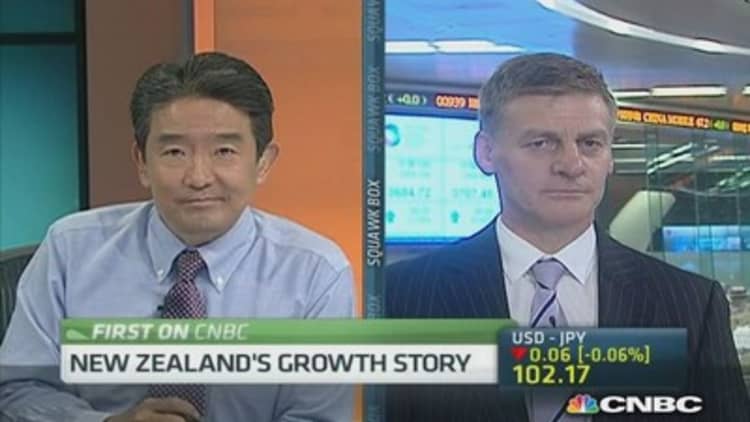
The New Zealand dollar – tipped to be one of the hottest currency trades this year – soared to its highest level since August 2011 on Friday, but is there a danger the party could be over soon?
The kiwi hit a two-and-a-half-year high of $0.8693 on Friday, spurred by better-than-expected trade data and comments from the Reserve Bank of New Zealand's (RBNZ) deputy governor Thursday that suggested the bank was not worried about its recent strength.
The currency has been a hot trade in recent times amid expectations that New Zealand would be the first developed economy to hike interest rates, triggering a 13 percent surge in the dollar since June last year.
The RBNZ delivered on its promise earlier this month by hiking rates to 2.75 percent from a record low of 2.5 percent, and the tightening bias could continue with the central bank pledging previously to raise rates by 225 basis points over the next two years.
(Read more: New Zealand central bank hikes interest rates)
However, some analysts told CNBC that despite the stellar gains over the past year, good times for the kiwi may have a sell-by date.
"Both the kiwi and the Aussie dollar tend to go up the stairs and down the elevator," David Forrester, G10 foreign exchange and fixed income strategist at Macquarie bank told CNBC.
"I expect the kiwi to trend up to $0.89 at least but there is a limit to the upside. The bottom line is: U.S. dollar strength will bring it down," he said.
Forrester said he expects a rebound in the greenback to happen in the next few months, when the U.S. economy emerges from its "winter doldrums" and the market starts pricing in a Fed rate hike in the first quarter of 2015.
(Read more: New Zealand to go to election on September 20)
He also believes the rate hike projections by the RBNZ may be too aggressive.
"There will come a time when the central bank will have to reduce its rate hike expectations," he said, noting that fair value for the kiwi is in the low 80 U.S. cents.
Other analysts told CNBC they also saw the kiwi's recent trajectory stabilizing soon.

Chris Weston, chief market strategist at IG, said much of the RBNZ's hawkish stance has already been priced. He said the kiwi's surge this week was fueled more by overall risk-on sentiment towards commodity currencies, rather than New Zealand's economic fundamentals.
(Read more: This will be the 'rock star' economy of 2014)
"This is not just a story of New Zealand dollar strength but of the other commodity bloc currencies doing well," he said.
Weston sees the kiwi maintaining its current level of around $0.8684 over the next three months before falling back to around 84 U.S. cents by year end.
Boris Schlossberg, managing director at U.S.-based firm BK Asset Management, said it was clear that central bankers were prepared to weather a stronger currency for some time, in exchange for keeping control of its frothy property market.
"They [RBNZ] are getting to be much more concerned about inflationary pressures because there is a tremendous amount of demand in the New Zealand economy and there is a lot of pent up demand for housing," he told CNBC Asia's Squawk Box on Friday.
(Read more: Kiwi dollar too strong: New Zealand Finance Minister)
"So they are basically making a bet that they would rather suffer a strong exchange rate and make sure the interest rates cap any kind of a bubble in the housing," Schlossberg said, adding that this factor has made the kiwi even more attractive as a carry trade, given that it already offers the highest yields amongst industrialized nations.
— By CNBC's Katie Holliday: Follow her on Twitter @hollidaykatie


